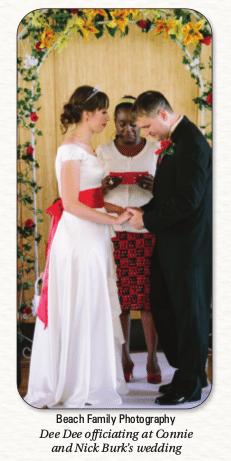A skilled and sensitive officiant can do more than simply guide your wedding ceremony. He or she can guide you through the process of creating a ritual that is meaningful and memorable. We reached out to two practiced officiants, Reverend Tom Goldsmith of the First Unitarian Church of Salt Lake and local actress and singer Dee-Dee Darby Duffin, to get their advice on wedding ceremonies and choosing the right officiant for the big day.
Reverend Tom Goldsmith has been marrying couples for 28 years. He’s stood uneasily with his back to a cliff while officiating, watched relatives from the flatlands pass out at high elevations, and was once asked to officiate while skiing backwards (he declined).
 Choosing an officiant is something that should be done with care, says Goldsmith, who encourages couples to “shop around” for an officiant who will suit their personal needs. Goldsmith often finds himself officiating for couples from different religious traditions who wish to blend elements of their faiths in the ceremony. Dee-Dee Darby Duffin specializes in non-religious ceremonies, but both agree that vows are the centerpiece of a wedding.
Choosing an officiant is something that should be done with care, says Goldsmith, who encourages couples to “shop around” for an officiant who will suit their personal needs. Goldsmith often finds himself officiating for couples from different religious traditions who wish to blend elements of their faiths in the ceremony. Dee-Dee Darby Duffin specializes in non-religious ceremonies, but both agree that vows are the centerpiece of a wedding.
Duffin and Goldsmith both underscore the importance of creating a meaningful and personal ceremony reflective of the two people who are coming together. For some, that might mean asking a friend or family member to serve as their officiant. To do this, the selected officiant must be legally ordained. Many online ordination services (such as the Universal Life Church, www.ulc.org) promote their services as “free.” However, for the wedding to be legally valid, you must purchase their ordination credentials and/or a letter of good standing ($20-40) to present when the marriage is registered.
Vows, according to Goldsmith, are not for gushing about your eternal love. They’re for expressing a public promise before important witnesses. Goldsmith, who provides couples with a packet on vows and how to construct them, suggests couples ask, “What is it that we’re promising each other?” Goldsmith also recommends that couples read their vows or repeat them after him instead of spending the ceremony anxiously wondering if they’ll forget what to say.
Duffin brings a different approach to vows. Attentive to the needs of her couples, Duffin, who is after all a professional performer, often ends up presenting the vows for them. A natural storyteller, Duffin crafts a couple’s vows after numerous meetings and discussions with the partners, both together and separately, more often than not over a beer. Duffin poses various questions to the couple, gaining an intimate knowledge of their relationship before retelling their story. She also asks that the couple choose a trusted delegate who will review her work before the ceremony, thus keeping the vows a surprise while ensuring they are the right match for each person.
So, when planning a wedding ceremony, consider these pieces of advice from the professionals: Take your time finding the best officiant for you and remember, it may be a friend or family member; spend time and attention creating meaningful vows; consider gestures to wed the two families; incorporate traditions from either’s background; include attendees by inviting spontaneous statements and/or preplanned readings.
Clare Boerigter loves a good ritual.
